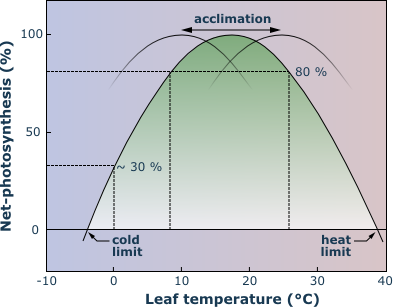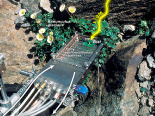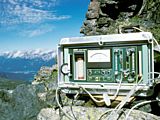Photosynthesis of alpine plants
The net photosynthetic uptake of CO2 by leaves of alpine plants is largely driven by the duration of the season (or leaf longevity) and by the light regime. Cloudy weather or snow cover restrict CO2-assimilation.
Temperature itself is not a problem for photosynthesis for three reasons:
- Temperatures are commonly low in the plant layer only when there is no sun. During sunshine hours plants warm up (see Dynamic mountain climate).
- The photosynthetic temperature response follows a broad, bell shaped curve, with the consequence that plants reach > 80 % of maximum photosynthesis over a broad range of temperatures (Fig. 1).
- Because plant photosynthesis acclimates to the prevailing temperatures.
- Neither the maximum rate of photosynthesis, nor the seasonal carbon gain by leaves of alpine plants (per unit leaf area) differs from that in lowland plants.
- Alpine plants even compensate for the lower partial pressure of CO2 at high elevation.
- Photosynthesis already reaches 20-30 % of the maximum rate at temperatures around 0 °C and is reduced to zero only when leaves freeze (-3 to -6 °C) (Fig. 1).
- The major drivers of alpine plant photosynthetic carbon gain are solar radiation and season length.
These insights have emerged from measurements of leaf gas exchange in situ, i.e. without removing plants form their natural habitat. During such measurements, leaves are enclosed in an air conditioned chamber through which air is pumped at a known rate. Leaves absorb part of the CO2 which passes through the chamber (Fig. 2). This depletion of CO2 in the test air can be measured by using an infrared gas analyser (Fig. 3).
Remember: photosynthetic CO2 uptake per unit of leaf area of alpine plants is high, and not different from lowland plants.
CAM and C4: Alpine plants commonly use the C3 mode of photosynthesis, but there are a few C4 grasses near treeline and some plants use crassulacean acid metabolism (CAM) (see Alpine plants and water).



